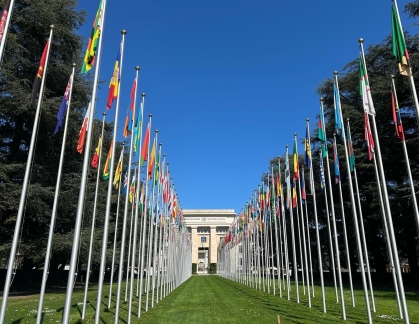Rutgers Law Students Help Shape Global Human Rights Dialogue in Geneva
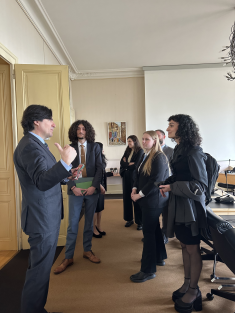
As part of a practicum course offered through Rutgers Law School’s Center for Transnational Law, a group of students recently traveled to Geneva, Switzerland for a firsthand look at international human rights in action. Over the course of five days, they attended sessions of the United Nations Committee Against Torture, a panel of 10 independent experts responsible for monitoring global compliance with the UN Convention Against Torture—the core international treaty designed to prevent torture and inhumane treatment around the world. “I offered this course because I want my students to gain as much real-world experience as possible,” says Professor of Law and Founding Director of the Center for Transnational Law Jorge Contesse, who not only teaches the course but also serves on the committee.
In preparation for the trip, students immersed themselves in the work of the committee, studying its core responsibilities and drafting memos on the six countries under review during its 82nd session: Armenia, France, Mauritius, Monaco, Turkmenistan, and Ukraine.
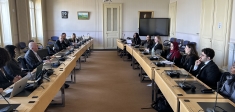
For 2L student Lougayen Souryal, that hands-on element was a major draw. “The opportunity to help draft questions that would assist the committee in its dialogues with state parties felt like a chance to contribute to something that could genuinely impact people’s lives,” she says. In fact, attending the consideration sessions, where committee members questioned state representatives, was the highlight of her experience. “It was gratifying to recognize the very questions my classmates and I had written throughout the semester being used in those sessions,” she says. “Seeing our work directly support the Committee Against Torture’s mission was a powerful and validating experience.”
Indeed, 3L student Daniel Altomare described sitting in on the second session of the state dialogue with France as “unaccountably exciting.” What made it especially memorable, he says, was witnessing Professor Contesse weave student research into his line of questioning and “really challenge the French delegation on their obligations under international law.”
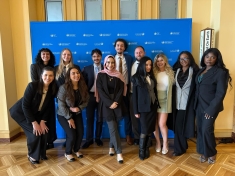
In addition to attending both public and private sessions of the committee, students had the opportunity to engage with a wide range of international experts. They met with committee members from around the world, diplomats involved in treaty negotiations, representatives from international NGOs, and UN officials from both the Office of the High Commissioner for Human Rights and the High Commissioner for Refugees.
For 2L student Elaine Robbins, whose passion for international law and the work of the UN drew her to the course, these conversations were eye-opening. “I was astounded by all the possible different career paths that led people to working in international law,” she says. “So many times throughout the course and trip, questions for further research would come up, and it was amazing to see what all the different life experiences of my classmates and I could lend to our understanding of complex topics.”
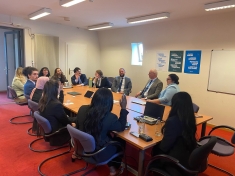
Beyond the classroom and committee sessions, students also found time to enjoy the charms of Geneva. They shopped for chocolate and souvenirs, toured the Palais des Nations, sampled local cuisine, and capped off the trip with a traditional Swiss fondue dinner alongside committee members.
“Seeing students put into practice in a multicultural lawyering space what they learned during the semester is uniquely rewarding,” Professor Contesse says. “I am very grateful to the university and to two outstanding alumni who made this possible. This is global legal education at its best."
